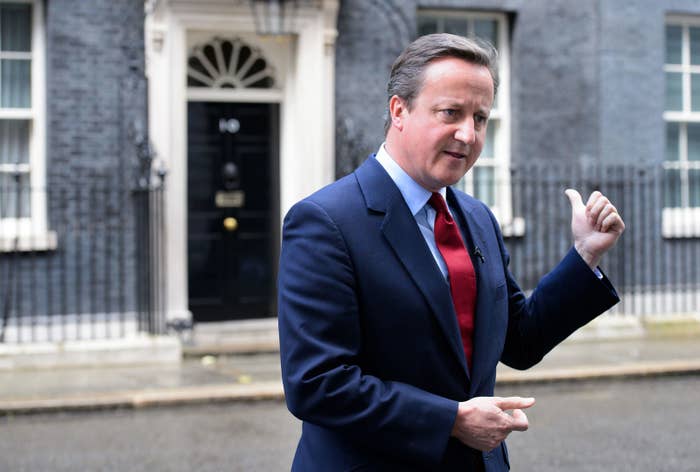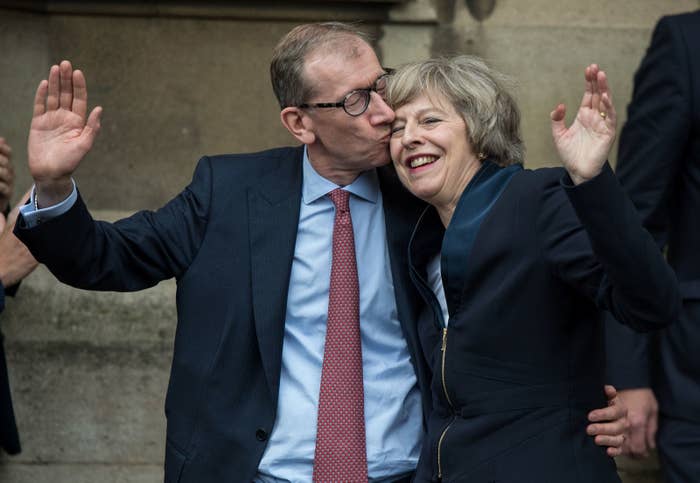
David Cameron has announced he will step down as prime minister on Wednesday afternoon to make way for Theresa May, ending his six-year stay in 10 Downing Street.
The prime minister will quit earlier than expected after Tory MP Andrea Leadsom's surprise withdrawal from the Conservative leadership contest on Monday morning left the way clear for May, who has been home secretary since 2010.
Theresa May only officially launched her leadership campaign on Monday morning but hours later was preparing to move into Downing Street.
She said she was "honoured and humbled" by the announcement and promised to lead the UK out of the EU, despite campaigning for Remain during the referendum.
May was joined outside parliament by supporters and her husband following a 5pm meeting of the 1922 committee of Conservative backbenchers, who approved her nomination as party leader in a short meeting while celebrating by banging on the tables of the House of Commons room.
On the steps of the House of Commons she set out her basic policies: "During this campaign my case has been based on three things: First, the case for strong, proven leadership to steer us through what will difficult and uncertain political and economic times. The need, of course, to negotiate the best deal for Britain in leaving the EU. And to forge a new role for ourselves in the world. Brexit means Brexit and we're going to make a success of it.
"Second, we need to unite our country. And third, we need a strong, new positive vision for the future of our country. A vision of a country that works not for the privileged few but that works for every one of us. Because we're going to give people more control of their lives."

The sudden change in events caught both Cameron's and May's teams by surprise, forcing a sudden change in plans for both. Cameron no longer has to concern himself with leading what had effectively become a caretaker government, while May escapes a long summer leadership campaign but finds herself as leader of the UK with a limited number of official policies.
"I think Andrea Leadsom has made absolutely the right decision to stand aside," Cameron said in a statement outside Number 10 on Monday afternoon.
He welcomed May's designation as the new leader: "She is strong, combatant, she is more than able to provide our country with the leadership it is going to need in the years ahead."
He initially announced his resignation in the early hours of 24 June, the day after losing the EU referendum campaign.
Cameron will chair his final cabinet meeting on Tuesday before taking part in his final Prime Minister's Questions at Wednesday lunchtime. He will then head to Buckingham Palace and formally offer his resignation to the Queen.
May will then be invited by the Queen to form the next government and will move into Downing Street by Wednesday evening, Cameron said.
Leadsom had initially been considered an outsider candidate when she declared her candidature last week – a largely unknown junior minister who simply wanted to secure a leading place in a Boris Johnson government.
She surged in support among pro-Brexit MPs appalled by the way Michael Gove brutally removed Johnson from the leadership race and ended up second on the ballot of MPs, buoyed by apparent grassroots support and a march to parliament.
However, two weeks of press scrutiny of her record, personal life, and views on motherhood appeared to take its toll and she decided to stand down on Monday.
"A nine-week leadership campaign at such a critical moment for our country is highly undesirable," Leadsom said in a statement. "We now need a new PM in place as soon as possible.
"Theresa carries over 60% of support from the Parliamentary party. She is ideally placed to implement Brexit on the best possible terms for the British people."
Theresa May had set out many of her key objectives earlier in the day, with a focus on social reform.
"We need a government that will deliver serious social reform – and make ours a country that truly works for everyone," she said in Birmingham.
"Because right now, if you’re born poor, you will die on average nine years earlier than others. If you’re black, you’re treated more harshly by the criminal justice system than if you’re white. If you’re a white working-class boy, you’re less likely than anybody else to go to university. If you’re at a state school, you’re less likely to reach the top professions than if you’re educated privately.
"If you’re a woman, you still earn less than a man. If you suffer from mental health problems, there’s too often not enough help to hand. If you’re young, you’ll find it harder than ever before to own your own home."
Tory MPs who had supported Leadsom immediately rallied around May following the declaration of the result. Jacob Rees-Mogg told Sky News he had backed "all the horses" by supporting the campaigns of Boris Johnson, Michael Gove, and Andrea Leadsom, but was now firmly behind May.
"The best thing for the country is having a rapid decision of who the leader should be," agreed Peter Lilley.
